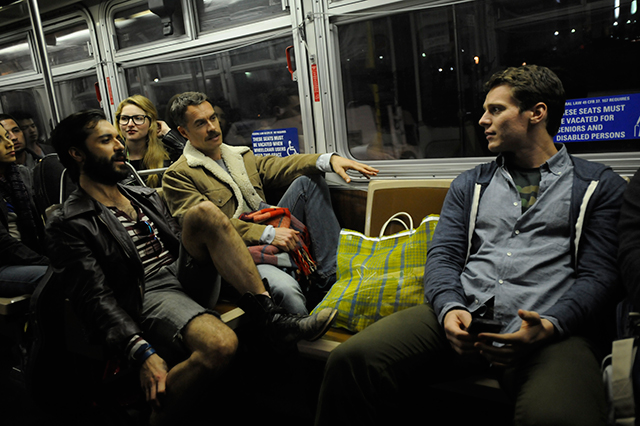In the past week, you've probably read at least two articles on how San Francisco is changing, super expensive, not as gay as you'd think, or just plain doomed. Those pieces have a point: every other weekend is a going-away party for a bestie, every other post on Facebook is asking for housing leads for evicted friends, every other neighborhood spot is being replaced by a fancy wine and cheese place, and every now and then, portions of your favorite bar are cordoned off for the rowdy kids from The Real World or your commute home is blocked by a premium cable show filming on your block.
With the sequel of the dot-com boom in full swing, it makes sense that Hollywood has turned its eye onto our once relatively under-the-radar hamlet. When news broke that HBO was coming to town to make a "real" portrait of gay men living in San Francisco, the knee-jerk instinct was a guarded one. Would they do our community justice? Or would they pack Esta Noche full of white people, exoticize gay sex as "titillating," and throw in some drag terms for good measure (no T, no shade!).
Leading up to the series premiere on January 19th, the internet has pretty loudly taken issue with the show without actually having seen it. Some say, it doesn't speak to every 20- or 30-something gay man's experience (an impossible feat). And like the qualms many have with that other Millennial HBO hit Girls, there has been lots of discussion on who is being left out of this portrait. But let's get beyond preemptive assumptions and find out what Looking actually gets right about being gay in San Francisco -- and what it gets wrong. After watching the first four episodes, here's my take:
RIGHT

- Most television shows and movies that take place in San Francisco only present the postcard face of the city (the Golden Gate Bridge, the Painted Ladies) or really miss the mark with the way they characterize the people who live here (everyone coming across as country bumpkins with Jersey accents in Blue Jasmine). The worst offense is when these productions show characters hanging out in Fisherman's Wharf. Locals do sometimes hang out there...if they're really craving In 'N' Out. Thankfully, the producers behind Looking actually did their research before filming. The boys mainly walk around the Mission, unless they're going clubbing or scoping out older gays in the Castro. And director Andrew Haigh captures the cinematic beauty of streets that aren't called Lombard and even the inside of Muni buses and BART cars. It's the version of San Francisco that we all know and love, the one that visiting friends are always pleasantly surprised to find.
- Looking doesn't sugarcoat their representation of life in the city; the apartments are realistically sized and the show doesn't overlook the recent tensions of the city. Dom, a 39-year-old waiter at Zuni (Murray Bartlett), becomes frustrated with high-maintenance customers: "Tech a-holes. It's like 1999 again and I hated them the first time." And Agustin, a 31-year-old artist (Frankie J. Alvarez), decides to move to Oakland so he can live with his boyfriend and because he "really can't afford the city anymore." Who isn't crossing the Bay for their shot at a yard and domestic bliss these days?
- Even if you don't go to yoga several times a week or go on meditation retreats, most people who live here can probably tell you their rising sign, frequently discuss the "energy" of a person or place, and might even be able to read your tarot. The Summer of Love set a tone of vague spirituality and a hippie sensibility that still exists today. Looking captures this subtle influence when Dom uses this pick-up line on a coworker: "I'll put my positive energy into your universe." Namaste!
- In the series premiere, Patrick, the 29-year-old video game designer protagonist (Jonathan Groff), attends his ex boyfriend's bachelor party at El Rio, a.k.a. the only place for a queer to drunkenly dance during the day. It was refreshing (and a tiny bit distracting) to see all the familiar faces from that scene present as extras playing shuffleboard or just having the times of their lives like they usually do.
WRONG


